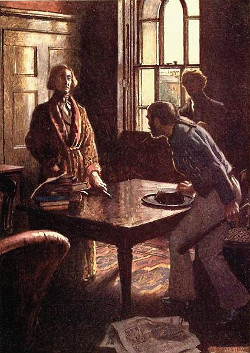
Edgar Allan Poe’s “The Murders in the Rue Morgue” is credited with being the first modern detective story — biographer Jeffrey Meyers says it “changed the history of world literature.” The story established the convention of the brilliant investigator who unveils a climactic revelation before explaining the reasoning that led him to it. The lead character, C. Auguste Dupin, served as a prototype for fictional detectives from Sherlock Holmes to Hercule Poirot.
But Poe himself thought the praise was overblown. “These tales of ratiocination owe most of their popularity to being something in a new key,” he wrote. “People think them more ingenious than they are — on account of their method and air of method. In the ‘Murders in the Rue Morgue,’ for instance, where is the ingenuity in unraveling a web which you yourself … have woven for the express purpose of unraveling?” The brilliance of a detective story is transparently contrived, he said: “The reader is made to confound the ingenuity of the suppositious Dupin with that of the writer of the story.”
